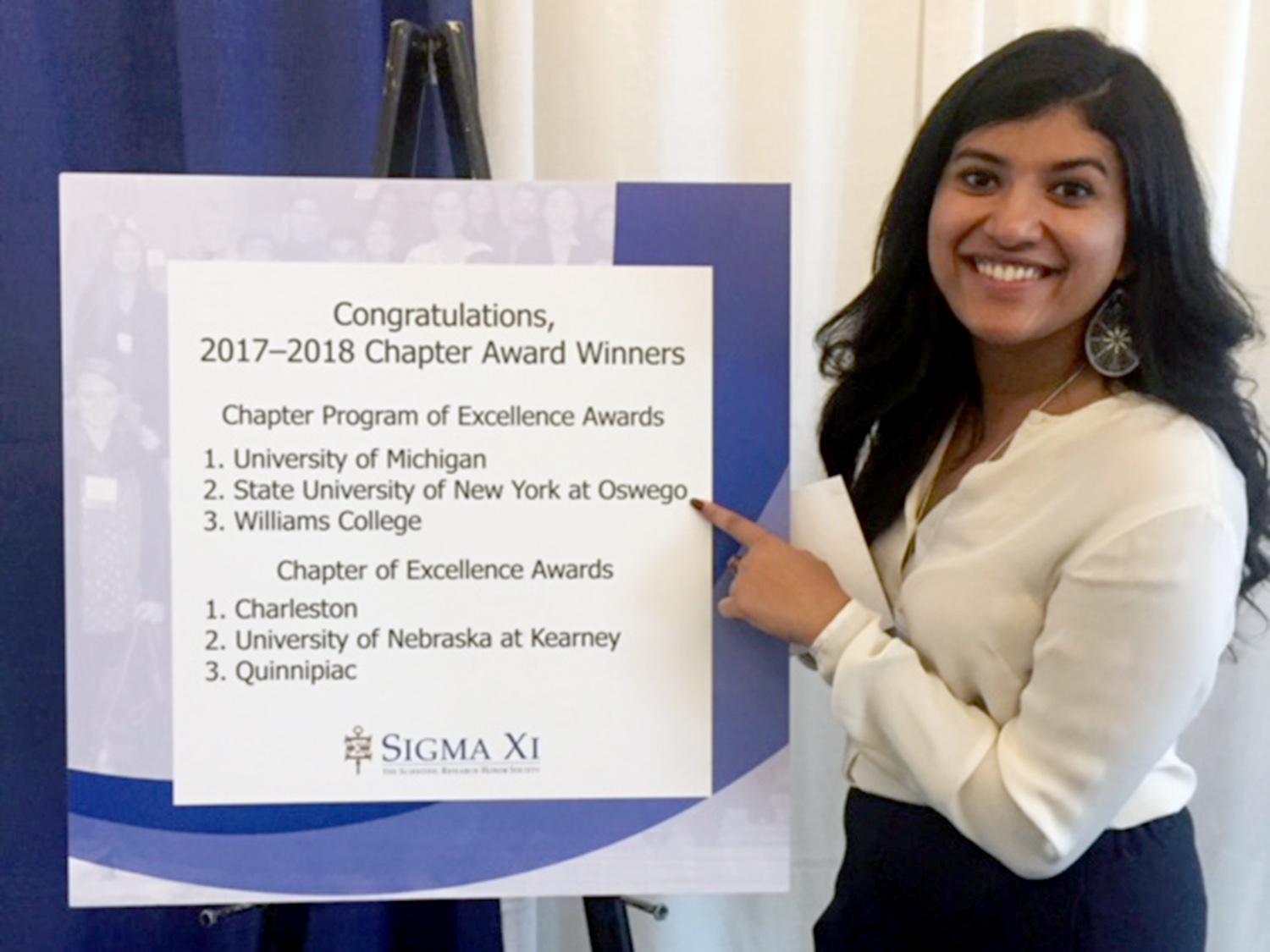International honors -- SUNY Oswego senior biology major Manna Job recently earned Top Presenter recognition in the Ecology and Evolutionary Biology category for college participants at the Sigma Xi International Conference for “Effects of Atrazine on Freshwater Mussels (Elliptio complanata),” research conducted with biological sciences faculty member Poongodi Geetha-Loganathan. The sign displays another honor at the conference -- the SUNY Oswego chapter earned a Sigma Xi Chapter Program of Excellence Award.
SUNY Oswego senior biology major Manna Job recently earned a top prize at the Sigma Xi International Conference for research on how a widely used chemical impacts the environment.
“Effects of Atrazine on Freshwater Mussels (Elliptio complanata),” Job’s poster of her research with faculty member Poongodi Geetha-Loganathan, earned Top Presenter recognition in the Ecology and Evolutionary Biology category for college participants at the conference, Oct. 26 and 27 in San Francisco.
The local chapter of the international research honor society also accepted a Sigma Xi Chapter Program of Excellence Award at the conference.
“It was a huge conference and I wasn’t expecting to win anything,” Job said. “I was very happy for my mentor because she puts in a lot of work, so to be able to represent her and Oswego is very exciting.”
Job was one of four Oswego students -- along with Asya Kadic, Bianca Fernandez and Jack Marcucci -- to present research findings, all for work with biological sciences faculty. Kadic also collaborates with Geetha-Loganathan, while Fernandez and Marcucci perform research with Yulia Artemenko.
Atrazine has been widely used as a herbicide in the United States, and the study by Job and Geetha-Loganathan with freshwater mussels has broken new ground in researching the chemical’s effects.
Significant research
“I think it’s a project of significance because we are spending time studying these chemicals in animals,” Job said. Mussels are a common biomarker -- they are filter feeders that absorb and diffuse chemicals into their cells -- which makes them ideal to study.
Job looked at how the chemical affected mussels’ breathing and reproductive functions, comparing those exposed to atrazine with a control group. The ciliary filaments of the gills were fused or absent in the exposed mussels, which disrupts feeding, respiration and basic needs, Job explained. Reproductive organs and functions suffered damage that would jeopardize the species’ future prospects.
Because freshwater mussels are part of the food chain and clean water affects humans and all other species, the project finding evidence of atrazine’s effects has wide-ranging impacts. “It’s important to know what these chemicals are doing to these animals we come into constant contact with. If we’re exposed to it, we want to know what it does,” Job noted.
“Manna is one of the great additions to my research group,” said Geetha-Loganathan, an assistant professor of biological sciences. “This is my first project using an invertebrate model organism and it has been a rewarding new learning experience for both me and Manna. Although the project is still in its preliminary stage, the appreciation we earned is greatly encouraging.”
For her part, Job is thankful for the research opportunities and close relationship faculty members offer students at Oswego, and especially the support Geetha-Loganathan continues to provide.
“She has been really helpful, always looking for additional resources and opportunities to support my future,” Job said of Geetha-Loganathan. “I really appreciate how hard she works to push all of us to do well.”
The research also dovetails with a key interest of the college in its first-ever Grand Challenges project, themed Fresh Water for All given the topic’s wide-ranging impact on the world and all its inhabitants.
Sigma Xi success
In addition, the SUNY Oswego chapter earned a Sigma Xi Chapter Program of Excellence Award for the "Sigma Xi Student Award at the Quest Symposium” program.
The program unfolded under the leadership of the Geetha-Loganathan (Sigma Xi Chapter secretary), David Dunn (Sigma Xi Chapter treasurer, assistant professor in biological sciences), Marianne Hromalik (Sigma Xi Chapter vice-president, associate professor in electrical and computer engineering) and Carolina Ilie (Sigma Xi Chapter president, associate professor in physics).
This award recognizes chapters that have organized an outstanding program, especially one that other chapters can emulate. In particular, the Program of Excellence Award recognizes initiatives that address the four cornerstones of the society’s mission: honor in science and engineering, STEM education, science policy, and the public understanding of science.
The SUNY Oswego chapter was one of just seven out of 525 chapter-based programs to receive such prestigious awards.
Job’s award also continues a successful track record for Oswego’s student researchers.
“It is a great honor for Manna to be presented this prestigious award by Sigma Xi, and I am extremely proud that my research group is winning an award at the Sigma Xi Student Research Conference for two times in a row,” Geetha-Loganathan said.
Last year, Emma Strujo won the Student Choice Award for Best Poster at the annual conference for “Effects of Prenatal Music Stimulation on Early Embryonic Development of Gallus gallus.”
“I have been fortunate to work with highly motivated students and want to thank them all for shaping my professional development,” Geetha-Loganathan said. “I will continue to make contributions to my research field, elevating the research quality of SUNY Oswego and cultivating new generations of researchers.”
For more information on biological sciences academic programs and research at SUNY Oswego, visit the department's website.




